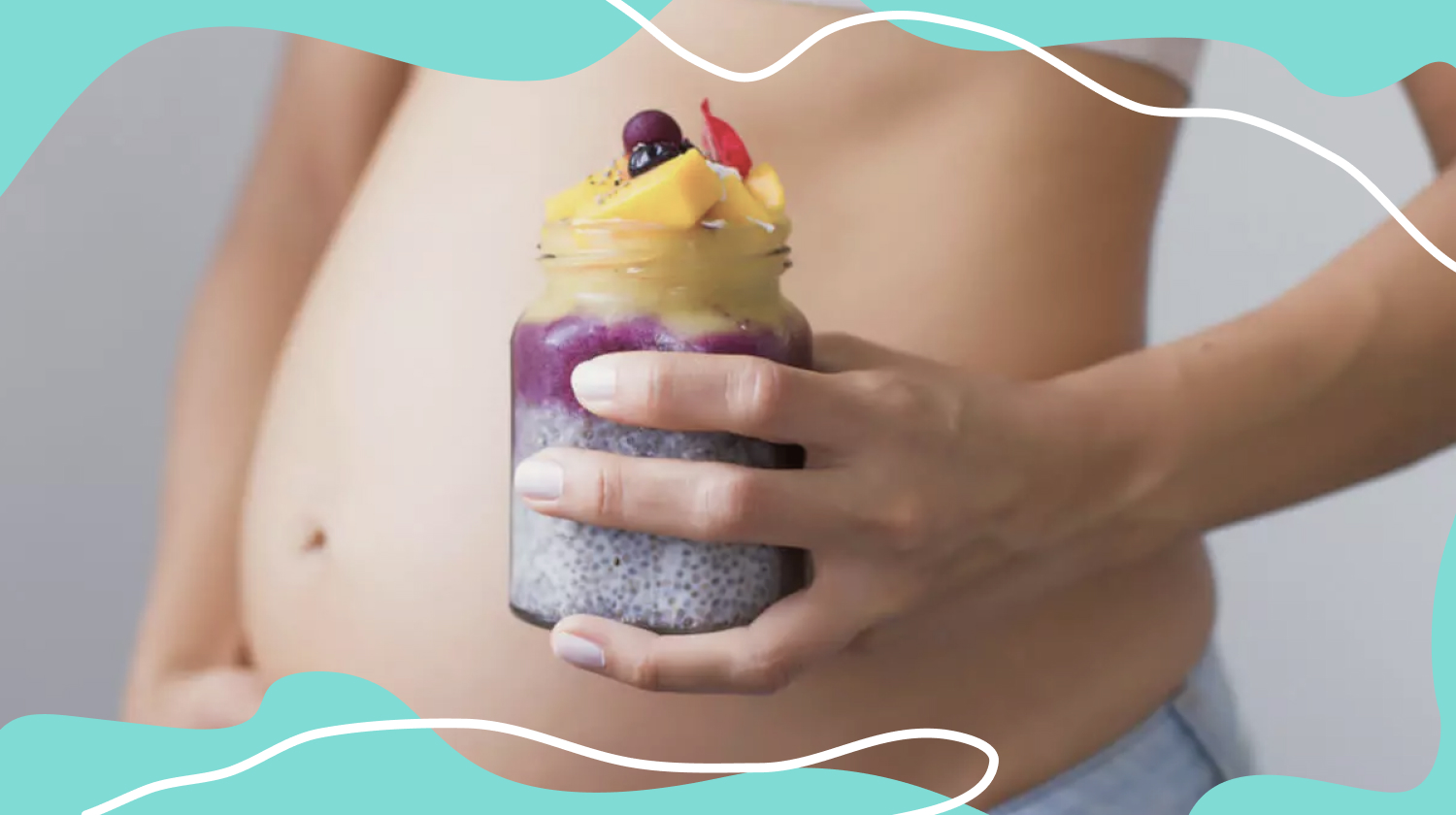Can You Eat Chia Seeds While Pregnant? Is It A Safe Thing To Do?

There are many reasons that women should be picky about their pregnancy diet. Consuming foods with high nutritional value from early pregnancy can help your growing baby develop normally, improve your breast milk production, and speed up your postpartum recovery.
Pregnant women can improve their health and the health of their unborn babies by choosing healthy fats, whole grains, and protein-rich foods to include in their diet. If you are pregnant, consuming chia seeds can help you meet all of these nutritional goals and more.
Are Chia Seeds Safe to Eat During Pregnancy?
While some foods should be avoided during pregnancy, chia seeds are not one of them. They are completely safe to consume while you are pregnant.
Chia seeds have many health benefits. Some people eat chia seeds for weight loss, while others use them for their antioxidant and cancer-fighting effects. During pregnancy, chia seeds can provide important vitamins, minerals, and nutrients for a mother and her growing baby.
Nutritional Profile Of Chia Seeds

Chia seeds are a highly nutritious food. They contain essential fatty acids like omega 6 and omega 3’s, plenty of fiber, and plenty of antioxidants.
One ounce of dried chia seeds contains:
- Calories 139
- Total Fat 8.72g
- Saturated Fat 0.9g
- Polyunsaturated Fat 6.615g
- Monounsaturated Fat 0.6g
- Cholesterol 0mg
- Sodium 5mg
- Total Carbohydrate 12.43g
- Dietary Fiber 10.7g
- Net Carbohydrates 1.73g
- Protein 4.43g
- Calcium 179mg
- Potassium 45mg
Health Benefits Of Chia Seeds In Pregnancy
Chia seeds pack a nutritional punch that can:
- Help baby’s brain development
- Boost red blood cell production
- Improve digestion
- Stabilize blood sugar levels
- Fight cancer

Help Baby’s Brain Development
According to the American Pregnancy Association[1], consuming healthy fats such as the ones found in chia seeds while pregnant is essential to fetal brain development. More specifically, the omega-3 fatty acids in chia seeds help with the development of vision, cognition, and neurological function in growing babies.
There is also evidence showing[2] that omega-3 fatty acids can decrease the risk of mental health problems such as depression, anxiety, and ADHD. Not only can chia seeds reduce the risk of these problems in an unborn baby, but for their mother as well.
Boost Red Blood Cells
The body can not make red blood cells without enough iron.
It is common for women to struggle with iron-deficiency anemia, and it is even more common during pregnancy. Pregnant women can boost their red blood cell production by increasing their iron intake.
Many supplements that contain iron can cause nausea and constipation. Fortunately, chia seeds are safe and effective for increasing the iron content in your diet. Chia seeds contain about 8mg of iron per serving, which is about 50% of what an adult needs daily.
Keep A Healthy Blood Sugar Level
The Centers for Disease Control[3] reports that gestational diabetes affects 2-10% of all pregnant mothers in the United States. High blood glucose during pregnancy can cause serious problems to your baby’s health such as premature birth, low blood sugar, and high birth weight.
Maintaining a normal blood sugar level isn’t just important for your baby, it is important for you too. A pregnant woman who does not control her blood sugar is at risk of developing type 2 diabetes later in life.
Chia seeds can help regulate your blood glucose levels, keeping them from spiking after you eat a meal or dropping and making you feel weak or light-headed.
Maintain Healthy Digestion
Experts at the Cleveland clinic estimate that up to 40% of pregnant women[4] experience constipation during pregnancy. This is caused by the hormone progesterone, the changing shape of the abdomen, and eating the wrong types of foods.
The fiber content of chia seeds can help aid in digestion and prevent constipation. Just one to two tablespoons of chia seeds each day may relieve stomach discomfort caused by a diet without enough high-fiber foods.
Increasing Breast Milk Supply
Eating chia seeds or adding chia oil to your diet may increase your breastmilk supply. Because chia seeds pack so much nutrition into each serving, they are an excellent food for breastfeeding mothers.
Antioxidant Properties
Chia seeds contain antioxidants, which are known to improve health[5] and fight cancer. Antioxidant-rich foods can also lower blood pressure, improve heart health, and reduce inflammation throughout the body.
How Much Chia Seed Is Safe To Eat While Pregnant?
While consuming chia seeds during pregnancy is safe, you should be aware of a few of chia seeds’ side effects. Some potential side effects of chia seed consumption include:
Intestinal Blockage
Eating too many chia seeds at once may cause an accidental intestinal blockage. Because chia seeds absorb up to 27 times their weight in water, they can expand in the gastrointestinal tract and cause problems.
One man[6], who reportedly consumed a tablespoon of dry chia seeds, had to be admitted to the emergency department to remove a large clump of seeds from his digestive system.
Allergic Reactions
While rare, it is possible to have an allergic reaction to chia seeds. If you experience itching, hives, a rash, swelling in your face or tongue, dizziness, or difficulty breathing after eating chia seeds in pregnancy, seek medical care right away. These symptoms may be a result of a dangerous allergic reaction.
Reaction to Blood Thinners
The National Center for Complementary and Integrative Health warns that the omega-3 fatty acids in foods like chia seeds may interact with blood-thinning medications.
If you take a blood thinning medication, speak with your medical provider before making big changes to your diet or adding a dietary supplement.
Ways To Eat Chia Seeds During Pregnancy
There are plenty of ways to add chia seeds to your diet during pregnancy.
In a Protein Shake
Drinking a protein shake is a convenient way to add high-quality protein to your diet. Protein shakes are safe and healthy during pregnancy. In fact, some women notice that liquid food is less likely to cause pregnancy nausea.
Some of the best protein powders for pregnancy contain chia seeds. If you choose a protein shake that does not already contain chia seeds, you can simply add them. The tiny seeds may not even be noticeable when blended into your shake.
Drink Chia Seed Water
Chia seed water is easy to make. Simply add one to two tablespoons of chia seeds to 8-10 oz of water and let them soak. Chia seeds will expand as they absorb water, so make sure you drink the mixture before it gets too thick.
Many people like to add fresh lemon or lime to their chia water to improve its taste.
Mixed in A Breakfast Smoothie
A chia seed smoothie is an easy way to consume chia seeds along with many other nutritious foods. Chia seeds can be mixed in with any type of juice, blended fruit, or vegetables to make a delicious meal on the go.
As Part of Your Morning Supplements
Keeping a routine and planning out your meals is a way to ensure you are eating plenty of nutritious foods each day. If you take any supplements or multivitamins, you can add chia water to your daily routine.
In addition to adding chia seeds to your diet during pregnancy, make sure you are taking a high-quality multivitamin. Ritual vitamins reviews discuss many different options for vitamins in all stages of life.
Conclusion
Eating chia seeds in pregnancy is a great way to control blood glucose, maintain normal digestive function, and help your baby get the nutrients they need. Soaking chia seeds in water, adding them to a smoothie, or mixing them in pudding are some of the best ways to add chia seeds to your diet.
While there are a few risks to be aware of, such as allergic reactions and potential reactions with medications, chia seeds are generally regarded as a safe and healthy addition to a pregnancy diet.
+ 6 sources
Health Canal avoids using tertiary references. We have strict sourcing guidelines and rely on peer-reviewed studies, academic researches from medical associations and institutions. To ensure the accuracy of articles in Health Canal, you can read more about the editorial process here
- editor (2021). Omega-3 Fish Oil and Pregnancy. [online] American Pregnancy Association. Available at: https://americanpregnancy.org/healthy-pregnancy/pregnancy-health-wellness/omega-3-fish-oil-and-pregnancy/.
- DiNicolantonio, J.J. and O’Keefe, J.H. (2020). The Importance of Marine Omega-3s for Brain Development and the Prevention and Treatment of Behavior, Mood, and Other Brain Disorders. [online] 12(8), pp.2333–2333. doi:https://doi.org/10.3390/nu12082333.
- CDC (2022). Gestational Diabetes. [online] Centers for Disease Control and Prevention. Available at: https://www.cdc.gov/diabetes/basics/gestational.html.
- Clinic, C. (2021). Pregnancy Constipation: Pain, Causes, Treatments & Relief – Cleveland Clinic. [online] Cleveland Clinic. Available at: https://my.clevelandclinic.org/health/diseases/21895-pregnancy-constipation.
- Ullah, R., Nadeem, M., Khalique, A., Imran, M., Mehmood, S., Javid, A. and Hussain, J. (2016). Nutritional and therapeutic perspectives of Chia (Salvia hispanica L.): a review. [online] 53(4), pp.1750–1758. doi:https://doi.org/10.1007/s13197-015-1967-0.
- Mujahid Karam Ba (2023). How To Consume Chia Seeds During Pregnancy? – Aljazeera medical center. [online] Www.jmc.qa. Available at: https://www.jmc.qa/pregnancy/how-to-consume-chia-seeds-during-pregnancy.html.



